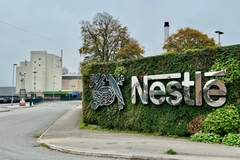
- Industry news
Industry news
- Category news
Category news
- Reports
- Key trends
- Multimedia
- Journal
- Events
- Suppliers
- Home
- Industry news
Industry news
- Category news
Category news
- Reports
- Key trends
- Multimedia
- Events
- Suppliers
General Mills Reiterates Commitment to Responsible Sourcing of Palm Oil After Protests

The statement came as 42 activists with Rainforest Action Network, Walker Church and other concerned community organizations unfurled a 30 x 70 ft. banner reading “Warning: General Mills Destroys Rainforests”.

21 Jan 2010 --- General Mills has said again that it is committed to sourcing palm oil in a socially and environmentally responsible manner. The statement came as 42 activists with Rainforest Action Network, Walker Church and other concerned community organizations unfurled a 30 x 70 ft. banner reading “Warning: General Mills Destroys Rainforests” outside of the company’s Minneapolis headquarters building.
The group said that the protest is the start of a corporate campaign against General Mills, asking the trusted food company to publicly commit to sourcing only palm oil produced in a socially and environmentally responsible manner. At least one hundred General Mills products, including such trusted brands as Pillsbury, Betty Crocker, Stovetop Hamburger Helper and Toaster Strudel contain palm oil or palm oil derivatives, violating General Mills’ stated social and environmental commitments, the group claimed.
“General Mills could do a lot to transform the palm oil supply in the food industry and to protect rainforests, communities and the climate,” said Madeline Gardner, Minneapolis-based activist. “As an industry leader and a trusted brand, General Mills could have a huge impact in changing the food industry for good.”
Production of palm oil, found in roughly half of all products sold in U.S. supermarkets, has risen significantly in recent years to meet growing worldwide demand. As a result, palm oil plantations are expanding rapidly into the tropical forests of Indonesia, Malaysia and Papua New Guinea, contributing heavily to global climate change, species extinction, and the displacement of Indigenous and local communities.
“Palm oil is a leading cause of rainforest destruction in places like Indonesia,” said Ashley Schaeffer of Rainforest Action Network. “As long as General Mills is using irresponsibly sourced palm oil, their customers will have to worry that they are contributing money to rainforest destruction.”
But General Mills has publicly expressed concern about the role of palm oil expansion in deforestation of tropical rainforests. The company has also voiced concern about the impact of deforestation on biodiversity and endangered species.
The company also said it is a relatively minor user of palm oil. “We have analyzed our use of palm oil,” said Gene Kahn, General Mills’ global sustainability officer. “General Mills does not purchase any palm oil directly. However, we do purchase ingredients produced from palm oil from suppliers. Overall, we calculate that General Mills’ use of palm oil and palm derivatives is modest – approximately .0004 percent of world exports.
“Nevertheless, we acknowledge that responsible users of even small amounts of ingredients can impact such issues via principled purchasing practices,” Kahn added. "As principled purchasers, we must continue to engage, monitor and collaborate with suppliers on this issue and many others – and we will continue to do so.”
General Mills has engaged suppliers directly in discussions about palm oil production. The company’s suppliers are already members and supporters of the Round Table for Sustainable Palm Oil (RSPO), and General Mills further reinforces the principles of the RSPO by limiting purchases only to RSPO members.
Activists have acknowledged General Mills’ positive position on the issue, said Kahn, including the company’s support for a moratorium on palm oil expansion in tropical rainforests and its direct engagement of suppliers – but continue to call on General Mills “to publicly commit to sourcing only palm oil produced in a socially and environmentally responsible manner.”









